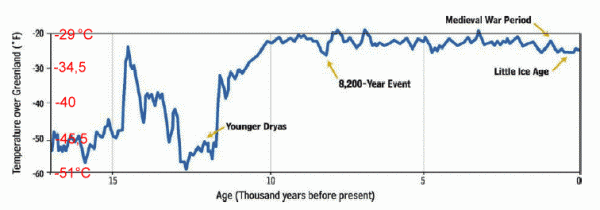|
|
 |
Climate change - more dangerous than Al Qaida?
The Pentagon asked one of their think tanks for a study on future dangers ...
|
 |
 |
|
Roland Emmerich
© 20th Century Fox
|
|
 |
An interview with film director Roland Emmerich:
 from Spiegel online KULTUR (German) from Spiegel online KULTUR (German)
Sitting in the cutting room, I thought, hopefully people will believe this story. And then I accidentially read in the ultra conservative American "Forbes"-Magazine a report about the Pentagon. They asked one of their think tanks to inquire, what might be the biggest threat in the near future. In first place: the climate turnover. Terrorism only made second place. In ice cores from the Arctic and Antarctica, which has given an insight into the climate of the last 100,000 years, they found indications for an abrupt climate change.
|
The 'Pentagon - Study'
In parallel to the film 'The day after tomorrow' a study made the headlines this year in February / March, which the Pentagon paid US$100,000 for. The topic: not military dangers but climate change. In the document with the subtitle 'Imagining the unthinkable' the authors regard the potential dangers of climate change as extremely high. Global warming could rather soon lead to a critical limit after which temperatures may drastically decrease.
Some projections:
|
- As temperatures rise during this decade, some regions may experience severe storms and flooding. As soon as 2007, surging seas could break through dykes in the Netherlands, making The Hague uninhabitable.
- By 2020, after a decade of cooling, Europe's climate becomes "more like Siberia's".
- Severe droughts will hit southern China and northern Europe around 2010 and last for 10 years.
- In the United States, agricultural areas suffer from soil loss due to higher winds and drier climate, but the country survives the economic disruption without catastrophic losses.
- Widespread famine in China triggers chaos, and "a cold and hungry China peers jealously" at Russia's energy resources. In the 2020-2030 period, civil war and border wars break out in China.
- In a "world of warring states", more countries develop nuclear weapons, including Japan, South Korea, Germany, Iran and Egypt.
- "Disruption and conflict will be endemic features of life"
|
 |
 |
 |
|
Eiffel tower in ice - also the Pentagon study predicts cold times for Europe.
© 20th Century Fox
|
|
|
The authors of the Pentagon report, Peter Schwarz and Doug Randall, are not climate experts. They are from the business sector and are used to developing scenarios for the future. For this study they interviewed climate scientists. However, they are not going to predict the future climate in the report 'Imaging the Unthinkable', but they are going to describe potential consequences, if the climate system should surprise us with unexpected dramatic changes. The idea that this surprise could be a strong cooling comes from the analysis of a climate event 8200 years ago. At that time, following a period of continuous warming, a significant cooling occurred, which lasted for about 100 years.
Download:  Imagining the Unthinkable Imagining the Unthinkable
Next page
|
 |
 |
|
Schwartz and Randall refer to the '8200-years-event' from the analysis of Greenland ice cores. The temperatures shown are values over Greenland in °F and °C.
Source: Pentagon-report 'Imagining the Unthinkable'.
|
|
 |
|







